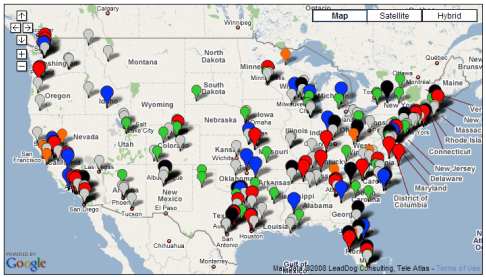Official national hero types
(Via Gene Expression 2008-04-04.)
Here’s the Danny Bonaduce of the Blogosphere, marking the occasion of the 40th anniversary of the death of Martin Luther King Jr., to reflect on the comforting lies about Dr. King, which the New Class political-intellectual complex has spent the last 40 years manufacturing and promoting:
Kai Wright has an excellent piece on the forgotten radicalism of Martin Luther King, Jr. — always a point worth making in a day and age when conservatives would like you to think they would have been standing right beside King when he marched on Washington.
That said, to some extent I think the creation of the King Myth and the displacement of the more authentic radical King is a good thing. A country doesn’t get official national hero types without mythologizing and sanitizing them to a large extent, and it’s a good thing, at the end of the day, that King has moved into national hero status.
— Matt Yglesias, The Atlantic (2008-04-04): MLK’s Radicalism
Really.
It seems to me that if the only way you can get official national hero types
is by oversimplifying, lying, and thus eviscerating the substance of a world-changing life of work and body of thought, then official national hero types
are worth less than nothing. What interest do they serve, and what are we supposed to need them for?
Certainly not the interest of honesty, or truth, and it seems to me that in these times those are coins far rarer — and therefore far more dear — than the pompous deliveries of the cosseted clique of power-tripping politicians and professional blowhards, who have convinced themselves that their collective in-jokes, shibboleths and taboos constitute the public life of a nation. I don’t give much of a damn, in the end, whether or not King gets ritualistically name-checked by men and women who were or would have been his mortal enemies to make stentorian speeches supposedly on his behalf. What I give a damn about is what the man, for all his many faults, actually cared about, fought for, and died for: the struggle of ordinary men and women for their own freedom, which meant their struggle to defy, resist, or simply bypass the consolidated violence of the belligerent power-mongers and the worse-than-useless moderate
hand-wringers who made their living peddling excuses, apologetics, and the endless counsel of wait, wait
.
This, not public-school pageants and official national hero types,
is what the vast majority of us, who get no profit from the fortunes of the political-intellectual complex and its pantheon, need:
As I have walked among the desperate, rejected, and angry young men, I have told them that Molotov cocktails and rifles would not solve their problems. I have tried to offer them my deepest compassion while maintaining my conviction that social change comes most meaningfully through nonviolent action. But they ask — and rightly so — what about Vietnam? They ask if our own nation wasn’t using massive doses of violence to solve its problems, to bring about the changes it wanted. Their questions hit home, and I knew that I could never again raise my voice against the violence of the oppressed in the ghettos without having first spoken clearly to the greatest purveyor of violence in the world today — my own government.
… All the while the people read our leaflets and received the regular promises of peace and democracy and land reform. Now they languish under our bombs and consider us, not their fellow Vietnamese, the real enemy. They move sadly and apathetically as we herd them off the land of their fathers into concentration camps where minimal social needs are rarely met. They know they must move on or be destroyed by our bombs.
So they go, primarily women and children and the aged. They watch as we poison their water, as we kill a million acres of their crops. They must weep as the bulldozers roar through their areas preparing to destroy the precious trees. They wander into the hospitals with at least twenty casualties from American firepower for one Vietcong-inflicted injury. So far we may have killed a million of them, mostly children. They wander into the towns and see thousands of the children, homeless, without clothes, running in packs on the streets like animals. They see the children degraded by our soldiers as they beg for food. They see the children selling their sisters to our soldiers, soliciting for their mothers.
What do the peasants think as we ally ourselves with the landlords and as we refuse to put any action into our many words concerning land reform? What do they think as we test out our latest weapons on them, just as the Germans tested out new medicine and new tortures in the concentration camps of Europe? Where are the roots of the independent Vietnam we claim to be building? Is it among these voiceless ones?
We have destroyed their two most cherished institutions: the family and the village. We have destroyed their land and their crops. We have cooperated in the crushing of the nation’s only noncommunist revolutionary political force, the unified Buddhist Church. We have supported the enemies of the peasants of Saigon. We have corrupted their women and children and killed their men.
Now there is little left to build on, save bitterness. Soon the only solid physical foundations remaining will be found at our military bases and in the concrete of the concentration camps we call
fortified hamlets.The peasants may well wonder if we plan to build our new Vietnam on such grounds as these. Could we blame them for such thoughts? We must speak for them and raise the questions they cannot raise. These, too, are our brothers.… These are the times for real choices and not false ones. We are at the moment when our lives must be placed on the line if our nation is to survive its own folly. Every man of humane convictions must decide on the protest that best suits his convictions, but we must all protest.
… A true revolution of values will lay hand on the world order and say of war,
This way of settling differences is not just.This business of burning human beings with napalm, of filling our nation’s homes with orphans and widows, of injecting poisonous drugs of hate into the veins of peoples normally humane, of sending men home from dark and bloody battlefields physically handicapped and psychologically deranged, cannot be reconciled with wisdom, justice, and love.
And also this:
We know through painful experience that freedom is never voluntarily given by the oppressor; it must be demanded by the oppressed. Frankly, I have never yet engaged in a direct action movement that was
well timed,according to the timetable of those who have not suffered unduly from the disease of segregation. For years now I have heard the wordsWait!It rings in the ear of every Negro with a piercing familiarity. ThisWaithas almost always meantNever.We must come to see with the distinguished jurist of yesterday thatjustice too long delayed is justice denied.We have waited for more than three hundred and forty years for our constitutional and God-given rights. The nations of Asia and Africa are moving with jet-like speed toward the goal of political independence, and we still creep at horse and buggy pace toward the gaining of a cup of coffee at a lunch counter. I guess it is easy for those who have never felt the stinging darts of segregation to say,
Wait.But when you have seen vicious mobs lynch your mothers and fathers at will and drown your sisters and brothers at whim; when you have seen hate filled policemen curse, kick, brutalize and even kill your black brothers and sisters with impunity; when you see the vast majority of your twenty million Negro brothers smothering in an airtight cage of poverty in the midst of an affluent society; when you suddenly find your tongue twisted and your speech stammering as you seek to explain to your six-year-old daughter why she can’t go to the public amusement park that has just been advertised on television, and see tears welling up in her eyes when she is told that Funtown is closed to colored children, and see the depressing clouds of inferiority begin to form in her little mental sky, and see her begin to distort her little personality by unconsciously developing a bitterness toward white people; when you have to concoct an answer for a five-year-old son asking in agonizing pathos:Daddy, why do white people treat colored people so mean?; when you take a cross-country drive and find it necessary to sleep night after night in the uncomfortable corners of your automobile because no motel will accept you; when you are humiliated day in and day out by nagging signs readingwhiteandcolored; when your first name becomesnigger,your middle name becomesboy(however old you are) and your last name becomesJohn,and your wife and mother are never given the respected titleMrs.; when you are harried by day and haunted by night by the fact that you are a Negro, living constantly at tip-toe stance never quite knowing what to expect next, and plagued with inner fears and outer resentments; when you are forever fighting a degenerating sense ofnobodiness; then you will understand why we find it difficult to wait. There comes a time when the cup of endurance runs over, and men are no longer willing to be plunged into an abyss of despair. I hope, sirs, you can understand our legitimate and unavoidable impatience.You express a great deal of anxiety over our willingness to break laws. This is certainly a legitimate concern. Since we so diligently urge people to obey the Supreme Court’s decision of 1954 outlawing segregation in the public schools, it is rather strange and paradoxical to find us consciously breaking laws. One may well ask:
How can you advocate breaking some laws and obeying others?The answer is found in the fact that there are two types of laws: There are just and there are unjust laws. I would be the first to advocate obeying just laws. One has not only a legal but a moral responsibility to obey just laws. Conversely, one has a moral responsibility to disobey unjust laws. I would agree with Saint Augustine thatAn unjust law is no law at all.… So I can urge men to disobey segregation ordinances because they are morally wrong.…
I must make two honest confessions to you, my Christian and Jewish brothers. First, I must confess that over the last few years I have been gravely disappointed with the white moderate. I have almost reached the regrettable conclusion that the Negro’s great stumbling block in the stride toward freedom is not the White Citizen’s Counciler or the Ku Klux Klanner, but the white moderate who is more devoted to
orderthan to justice; who prefers a negative peace which is the absence of tension to a positive peace which is the presence of justice; who constantly saysI agree with you in the goal you seek, but I can’t agree with your methods of direct action;who paternalistically feels he can set the timetable for another man’s freedom; who lives by the myth of time and who constantly advises the Negro to wait until amore convenient season.Shallow understanding from people of goodwill is more frustrating than absolute misunderstanding from people of ill will. Lukewarm acceptance is much more bewildering than outright rejection.I had hoped that the white moderate would understand that law and order exist for the purpose of establishing justice, and that when they fail to do this they become dangerously structured dams that block the flow of social progress. I had hoped that the white moderate would understand that the present tension in the South is merely a necessary phase of the transition from an obnoxious negative peace, where the Negro passively accepted his unjust plight, to a substance-filled positive peace, where all men will respect the dignity and worth of human personality. Actually, we who engage in nonviolent direct action are not the creators of tension. We merely bring to the surface the hidden tension that is already alive. We bring it out in the open where it can be seen and dealt with. Like a boil that can never be cured as long as it is covered up but must be opened with all its pus-flowing ugliness to the natural medicines of air and light, injustice must likewise be exposed, with all of the tension its exposing creates, to the light of human conscience and the air of national opinion before it can be cured. …
… You spoke of our activity in Birmingham as extreme. At first I was rather disappointed that fellow clergymen would see my nonviolent efforts as those of the extremist. … But as I continued to think about the matter I gradually gained a bit of satisfaction from being considered an extremist. Was not Jesus an extremist for love —
Love your enemies, bless them that curse you, pray for them that despitefully use you.Was not Amos an extremist for justice —Let justice roll down like waters and righteousness like a mighty stream.Was not Paul an extremist for the gospel of Jesus Christ —I bear in my body the marks of the Lord Jesus.Was not Martin Luther an extremist —Here I stand; I can do none other so help me God.Was not John Bunyan an extremist —I will stay in jail to the end of my days before I make a butchery of my conscience.Was not Abraham Lincoln an extremist —This nation cannot survive half slave and half free.Was not Thomas Jefferson an extremist —We hold these truths to be self-evident, that all men are created equal.So the question is not whether we will be extremist but what kind of extremist will we be. Will we be extremists for hate or will we be extremists for love? Will we be extremists for the preservation of injustice–or will we be extremists for the cause of justice? In that dramatic scene on Calvary’s hill, three men were crucified. We must not forget that all three were crucified for the same crime–the crime of extremism. Two were extremists for immorality, and thusly fell below their environment. The other, Jesus Christ, was an extremist for love, truth and goodness, and thereby rose above his environment. So, after all, maybe the South, the nation and the world are in dire need of creative extremists.
For anybody other than a self-appointed public intellectual, honest appraisal and serious engagement with the real life, virtues, foibles, questions, and struggles of a creative extremist like King are things more profound, more beautiful, more powerful, more passionate, and ultimately more useful than all the combined hagiographies and bed-time stories of the canonized saints of American theo-nationalism.

 Death of an innocent.
Death of an innocent. Death or injury of a police officer.
Death or injury of a police officer. Death of a nonviolent offender.
Death of a nonviolent offender. Raid on an innocent suspect.
Raid on an innocent suspect. Other examples of paramilitary police excess.
Other examples of paramilitary police excess. Unnecessary raids on doctors and sick people.
Unnecessary raids on doctors and sick people.

